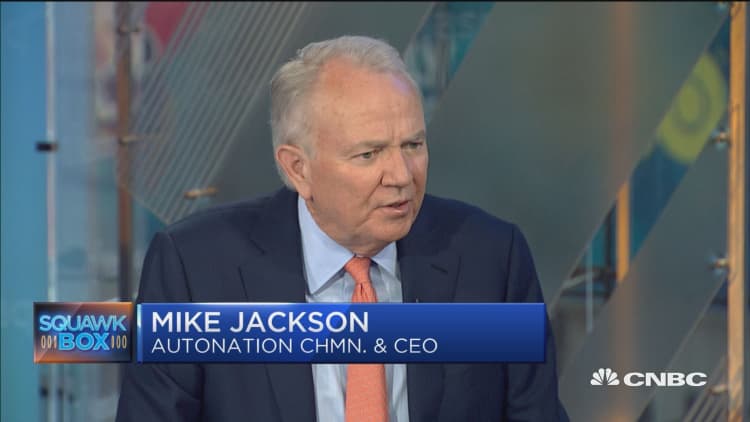With lots of inventory at auto dealerships, Labor Day means consumers are likely to snag a good end-of-summer deal.
"Cars are sitting on dealer lots longer than any time since 2009," said Jill Gonzalez, an analyst with WalletHub. "Dealers want to move these cars, both new and used. That's good news for consumers looking to buy either type of car."
Dealers now take an average of 74 days to sell a new car, the highest it's been since July 2009 when it was 80 days, according to J.D. Power.

Despite a general slowdown in auto sales so far in 2017, Labor Day typically is one of the biggest car-buying times. In 2016, more than 400,000 vehicles were sold during the holiday period, accounting for nearly 3 percent of annual sales, according to J.D. Power.
(Note for residents of southeast Texas and along the Gulf Coast affected by Hurricane Harvey who are unsure whether dealerships will be open this weekend: Call ahead. "Dealers are doing everything they possibly can to get open because they know people are desperate. They need transportation," said Wyatt Wainwright, president of the Houston Automobile Dealers Association.)
This also is the time of year that model years change. "The [2017] models will be discounted because they want to get rid of those before the 2018 models are on their lots," said Eric Lyman, chief analyst for TrueCar.com.
Manufacturers are expected to continue aggressive discounting to help move cars off the lot. The average dealer incentive is $3,805, up from $3,645 last August, according to J.D. Power.
In addition to dealers making room for 2018 models, continuing low interest rates also could help drive sales. Of course, the interest rates offered vary depending on the buyer's credit score and the source of the loan.
For people with great credit, the terms offered by the financing arm of a manufacturer generally trump other lenders. WalletHub data shows that the average interest rate for a five-year, $20,000 loan from a car manufacturer is 1.74 percent. In comparison, credit unions offer an average 2.48 percent interest rate; small and community banks, 4.07 percent.
"Some people think they can get the best rate at their credit union or a bank, but that's pretty much never the case, especially if you have good or excellent credit," Gonzalez said.
While many of the great terms end up being available only to consumers with excellent credit, Gonzalez said that individual circumstances can be a bargaining chip at the negotiating table. For instance, if a bankruptcy is about to come off your credit report, you might be able to get the dealership to offer a lower rate.
However, if your weaker credit is going to persist, consider delaying the purchase if you can. Gonzalez recommends taking time to save up a down payment to reduce the amount you'd have to finance at a less-than-favorable interest rate.
"The interest rate you'll pay with fair or bad credit makes it worthwhile to save as much as possible to put toward the car before you even have to think about financing," she said.
Overall, buyers with fair credit will end up spending about five times more to finance a vehicle than a consumer with excellent credit, paying an average $6,282 more in interest over the life of a $20,000, five-year loan, according to WalletHub.
The longer you wait, the less variety you'll have to choose from.Eric LymanChief analyst for TrueCar.com
Meanwhile, if you're in the market for a used car, the best values can be found in the traditional sedan segment (i.e., a Toyota Camry, Honda Civic, etc.) as demand for those styles has dropped.
"New-car demand has shifted to utility vehicles, creating a decline in demand for passenger cars," Lyman said. "So those used cars are presenting tremendous value for buyers."
For people with good or excellent credit, interest rates on used-car loans average 2.73 percent at credit unions, WalletHub data shows. At community banks, that average is 5.21 percent.
Lyman said that because sales events are already under way, there's no need to wait until the end of the weekend to car shop.
"The longer you wait, the less variety you'll have to choose from," he said. "The amount [you might save] would be negligible, if there were any price difference at all."


